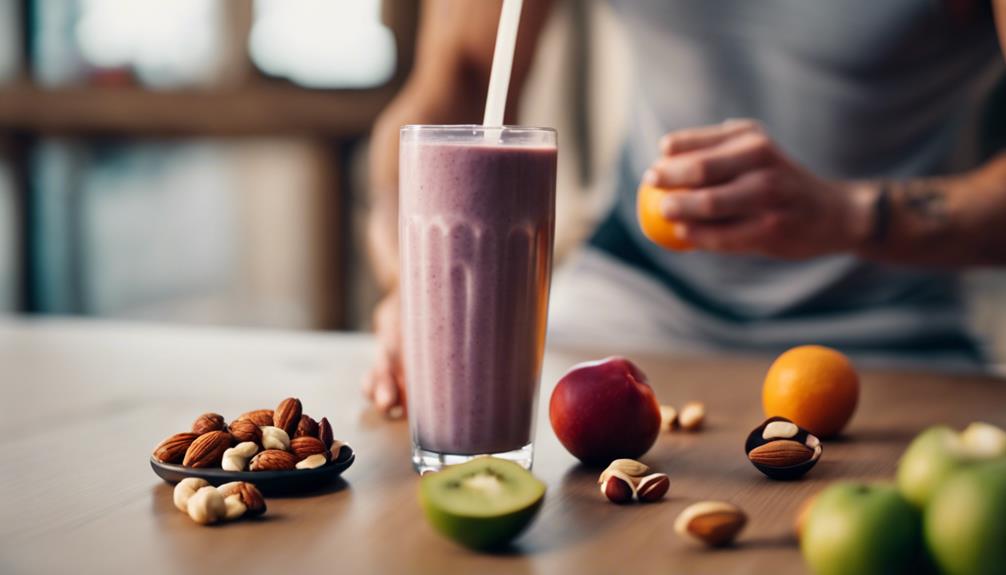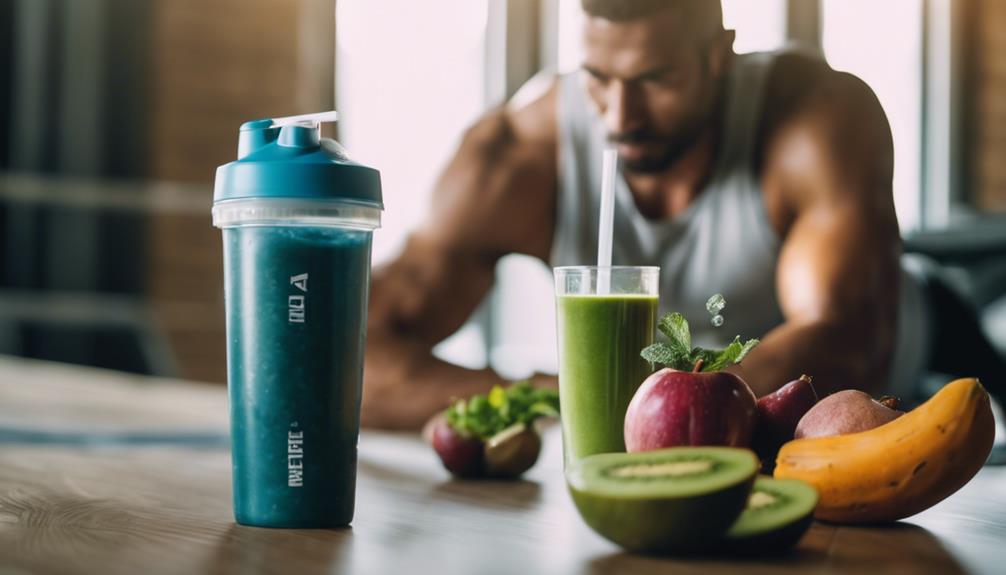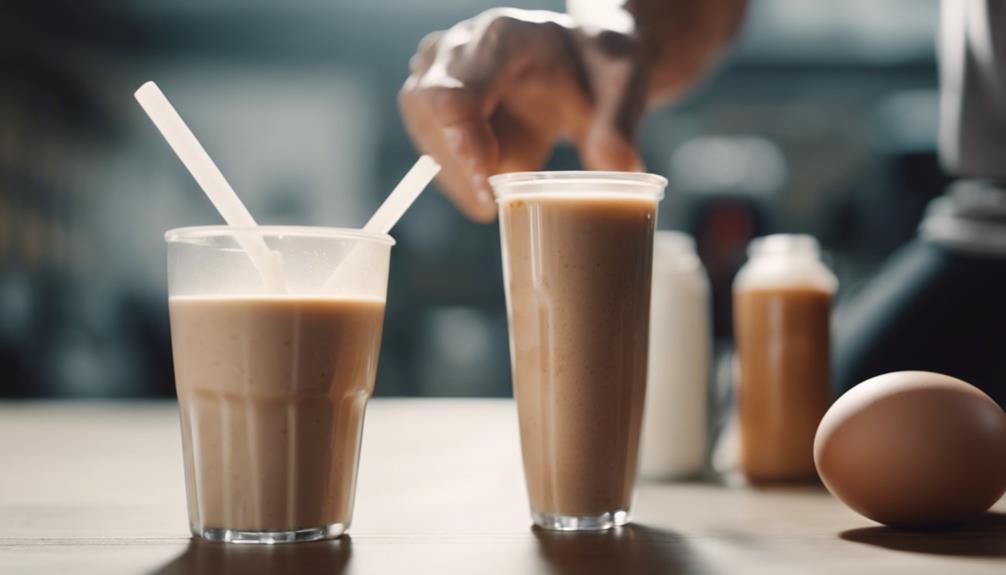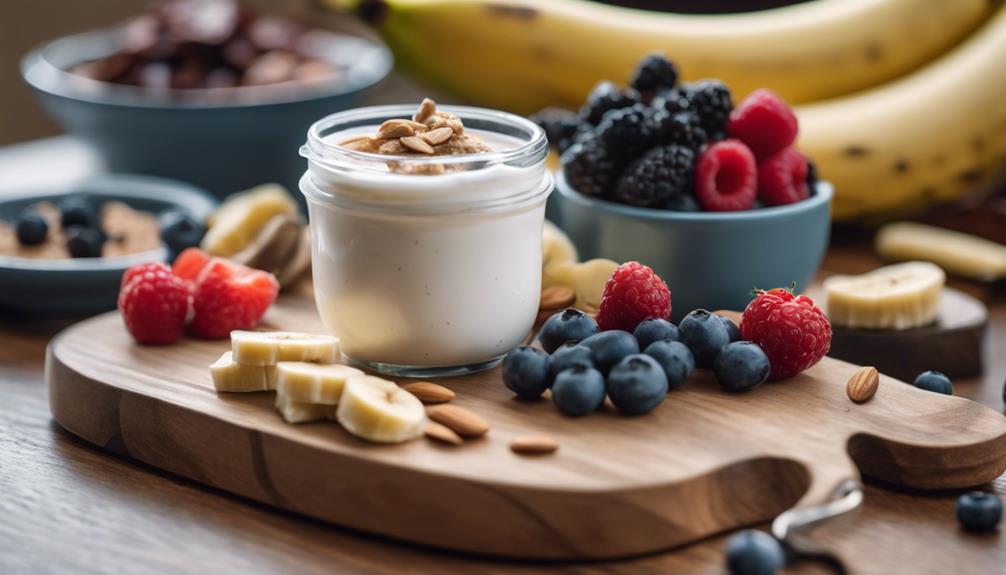The Importance of Post-Workout Nutrition
Ensuring you consume the right nutrients after your workout is crucial for optimal results. It goes beyond just grabbing any snack; post-workout nutrition has the power to significantly impact your fitness journey.
From aiding in muscle recovery and growth to replenishing glycogen stores, the choices you make post-exercise can make or break your progress. But why is this window of time so vital, and what exactly should you be fueling your body with to maximize your efforts?
Let's explore the key components that make post-workout nutrition a game-changer in your fitness routine.
Key Takeaways
- Balanced post-workout nutrition aids muscle recovery and energy replenishment.
- Protein intake supports muscle repair and growth post-exercise.
- Glycogen replenishment post-workout is essential for optimal performance.
- Strategic timing of nutrients and proper hydration enhance muscle recovery.
Benefits of Post-Workout Nutrition
After completing your workout, consuming a balanced post-workout meal or snack is crucial to replenish energy stores and support muscle recovery. The benefits of post-workout nutrition extend beyond simply refueling your body. Proper post-workout nutrition plays a significant role in enhancing your performance, maintaining optimal energy levels, and accelerating muscle repair to reduce recovery time.
When you engage in physical activity, your body depletes its energy stores. Consuming a meal or snack rich in carbohydrates and protein within a 30-minute to 2-hour window post-exercise can help restore glycogen levels and kickstart the muscle repair process. This quick replenishment of nutrients aids in enhancing your overall performance in subsequent workouts and daily activities.
Furthermore, adequate post-workout nutrition supports muscle recovery by providing the necessary building blocks for repairing and rebuilding muscle tissues. By optimizing your post-workout nutrition, you can expedite the recovery process, reduce muscle soreness, and improve your overall fitness progress. Remember, what you eat after your workout is just as important as the workout itself for achieving your fitness goals.
Muscle Recovery and Growth
To maximize muscle recovery and growth after a workout, prioritizing proper post-exercise nutrition is essential for optimal results. Muscle repair and recovery are crucial processes that occur after exercise. During a workout, muscles experience micro-tears and depletion of glycogen stores. Post-workout nutrition plays a vital role in replenishing glycogen stores and providing the necessary nutrients for muscle repair. Consuming the right nutrients post-exercise can enhance the recovery process, leading to muscle growth and regeneration.
A key element in post-workout nutrition is providing the body with the building blocks it needs for muscle repair. Nutrients like protein, carbohydrates, and antioxidants aid in restoring muscle tissue and reducing inflammation. Protein is particularly important for muscle recovery as it provides the amino acids necessary for repairing and rebuilding muscle fibers. Carbohydrates replenish glycogen stores, which fuel the muscles during exercise and support recovery. Antioxidants help reduce oxidative stress caused by intense physical activity, promoting faster recovery and overall muscle health.
Incorporating a well-balanced post-workout meal or snack that includes protein, carbohydrates, and antioxidants can significantly contribute to muscle repair, recovery, growth, and regeneration. By focusing on proper post-exercise nutrition, you can optimize your workout results and support your fitness goals effectively.
Importance of Protein Intake
Proper post-workout nutrition hinges significantly on ensuring an adequate intake of protein for optimal muscle recovery and growth. Protein is crucial as it provides the building blocks necessary for muscle repair and growth through a process called protein synthesis. Amino acids, often referred to as the "building blocks of protein," play a vital role in this process.
| Protein Intake Benefits | Details |
|---|---|
| Muscle Repair | Protein consumption post-workout helps repair the microscopic muscle damage caused during exercise. |
| Muscle Growth | Adequate protein intake supports muscle hypertrophy, aiding in the development of lean muscle mass. |
| Satiety | Protein-rich foods can help you feel fuller for longer, supporting weight management goals. |
To maximize the benefits of protein intake post-workout, aim for a combination of fast-digesting proteins like whey and slower-digesting proteins like casein. Remember, the key to enhancing muscle recovery and growth lies in prioritizing your protein intake after exercise.
Glycogen Replenishment
Efficient post-workout nutrition not only involves prioritizing protein intake for muscle repair and growth but also entails focusing on glycogen replenishment to restore energy stores for optimal performance and recovery.
After a workout, your body's glycogen stores become depleted as they're used up for energy during exercise. Glycogen is the storage form of glucose, which is crucial for providing energy to your muscles during physical activity. Replenishing these glycogen stores post-workout is essential for energy restoration and glycogen storage, ensuring that you have the necessary fuel for your next workout or daily activities.
When you consume carbohydrates after exercising, especially within the first 30 minutes to 2 hours post-workout, your body is better able to replenish its glycogen stores efficiently. This process is vital for muscle repair and cell growth, as it allows your body to recover effectively from the stress of exercise.
Nutrient Timing
Have you ever wondered when is the best time to consume nutrients for optimal post-workout recovery and performance enhancement? Timing strategies play a crucial role in maximizing the benefits of post-workout nutrition. By strategically timing your nutrient intake, you can enhance muscle repair, glycogen replenishment, and overall recovery.
Timing Strategies and Nutrient Combinations
| Timing Strategy | Nutrient Combination | Benefits |
|---|---|---|
| Pre-Workout | Carbohydrates + Protein | Provides energy for the workout and primes muscles for recovery |
| Immediately Post-Workout | Protein + Carbohydrates | Maximizes muscle protein synthesis and glycogen replenishment |
| 2 Hours Post-Workout | Protein + Healthy Fats | Supports muscle repair and growth, aids in hormone production |
| Bedtime Snack | Casein Protein | Sustained amino acid release during sleep for overnight recovery |
| Upon Waking | BCAA | Prevents muscle breakdown, jumpstarts recovery process |
Hydration Post-Workout
Optimizing your post-workout hydration is essential for supporting muscle recovery and replenishing lost fluids. Hydration strategies play a crucial role in performance optimization and overall well-being. Here are some key points to consider:
- Maintaining Electrolyte Balance: Replenishing electrolytes such as sodium, potassium, and magnesium post-workout is vital for muscle repair and proper function. Electrolytes help regulate fluid balance and muscle contractions, aiding in recovery.
- Hydrate Consistently: Ensure you drink fluids consistently throughout the day, not just during workouts. Consistent hydration supports overall performance and recovery by keeping your body functioning optimally.
- Choose Hydrating Foods: Incorporate hydrating foods like fruits and vegetables into your post-workout meals to boost fluid intake. These foods provide not only water but also essential vitamins and minerals to aid in recovery.
- Monitor Your Urine Color: Monitoring urine color can be a simple way to gauge your hydration status. Aim for a pale yellow color, indicating adequate hydration levels for optimal recovery and performance.
Role of Carbohydrates
After ensuring proper hydration post-workout, let's now focus on the crucial role of carbohydrates in supporting your recovery and performance. Carbohydrates are essential for replenishing muscle glycogen stores, which are depleted during exercise, and they play a vital role in restoring energy levels for your next workout. Carbohydrate timing is key to maximizing their benefits. Consuming carbohydrates within 30 minutes to 2 hours post-exercise is ideal as this is when your body is most efficient at replenishing glycogen stores.
| Carbohydrate Timing | Benefits |
|---|---|
| Within 30 minutes post-workout | Rapid glycogen replenishment, improved recovery |
| 1-2 hours post-workout | Sustained energy levels, enhanced performance |
Ensuring an adequate intake of carbohydrates post-workout can help prevent muscle breakdown and promote muscle growth. Additionally, maintaining optimal glycogen levels supports your immune function and overall well-being. By paying attention to carbohydrate timing, you can optimize your recovery and performance, allowing you to make the most out of your training sessions.
Protein Sources for Recovery
For optimal recovery post-workout, selecting the right protein sources is crucial to support muscle repair and growth. When considering protein options for recovery, it's essential to understand the digestion process and how different sources can impact your body's ability to recover effectively.
- Plant-Based Options: Plant-based proteins like beans, lentils, quinoa, and tofu are excellent choices for post-workout recovery. They not only provide high-quality protein but also offer essential vitamins, minerals, and antioxidants that support overall health.
- Lean Animal Proteins: Lean animal proteins such as chicken, turkey, fish, and eggs are easily digestible and rich in essential amino acids necessary for muscle repair and growth.
- Dairy Products: Dairy products like Greek yogurt and milk are quick-digesting protein sources that can help kickstart the recovery process after a workout.
- Protein Supplements: Protein supplements like whey or pea protein powders can be convenient options to ensure you're meeting your protein needs for optimal recovery.
Essential Vitamins and Minerals
To support your body's recovery effectively post-workout, ensuring adequate intake of essential vitamins and minerals is crucial for optimal performance and muscle repair. Essential vitamins such as Vitamin C, Vitamin D, and the B-complex vitamins play vital roles in various bodily functions, including energy production and immune system support. Minerals like magnesium, potassium, and calcium are essential for muscle function, nerve transmission, and maintaining electrolyte balance. These nutrients aid in replenishing what your body loses during exercise and promote efficient nutrient absorption, facilitating quicker recovery.
Electrolyte balance is particularly important post-workout to prevent muscle cramps and fatigue. Minerals like sodium and potassium help regulate fluid balance in the body, ensuring proper hydration levels and muscle function. Adequate intake of these essential minerals can also enhance exercise performance and reduce the risk of dehydration.
Anti-Inflammatory Foods
Ensuring your post-workout nutrition includes anti-inflammatory foods can aid in reducing muscle soreness and promoting faster recovery. When considering inflammation reduction and diet choices, incorporating the following anti-inflammatory foods into your meals can be beneficial:
- Fatty Fish: Rich in omega-3 fatty acids, fatty fish like salmon, mackerel, and sardines can help decrease inflammation and support muscle recovery.
- Leafy Greens: Vegetables such as spinach, kale, and Swiss chard are packed with antioxidants and nutrients that can combat oxidative stress and reduce inflammation.
- Berries: Blueberries, strawberries, and raspberries contain compounds that have been shown to have anti-inflammatory effects, aiding in post-workout recovery.
- Nuts and Seeds: Almonds, walnuts, flaxseeds, and chia seeds are excellent sources of healthy fats and antioxidants, which can help reduce inflammation and support overall recovery.
Post-Workout Snacks
Including nutrient-dense snacks in your post-workout routine can optimize recovery and support muscle growth. After a workout, your body needs quick fuel to replenish glycogen stores and kickstart the muscle repair process. Choosing snacks that provide an energy boost and essential nutrients is crucial for maximizing your workout efforts. Here are some post-workout snack options that can help you refuel effectively:
| Snack | Benefits |
|---|---|
| Greek Yogurt with Berries | Protein for muscle repair and antioxidants for recovery |
| Whole Grain Toast with Almond Butter | Complex carbs for energy and healthy fats for sustained fuel |
| Banana with Peanut Butter | Potassium for muscle function and protein for recovery |
| Chocolate Milk | Carbs and protein for glycogen replenishment and muscle repair |
These snacks not only taste great but also provide the necessary nutrients to support your body post-exercise. By incorporating these options into your routine, you can enhance recovery, promote muscle growth, and maintain your energy levels throughout the day.
Supplements for Recovery
Considering the demands of intense workouts, incorporating targeted supplements can significantly enhance your body's recovery process. Recovery supplements and performance enhancers play a crucial role in aiding muscle repair and replenishing energy stores after strenuous exercise. Here are some key supplements to consider adding to your post-workout routine:
- Protein Powders: Post-workout shakes containing proteins like whey or casein can promote muscle repair and growth, aiding in recovery after exercise.
- BCAAs (Branched-Chain Amino Acids): These essential amino acids can help reduce muscle soreness and fatigue, improving recovery time and enhancing performance in subsequent workouts.
- Creatine: Known for its ability to increase muscle mass and strength, creatine supplementation can support recovery by replenishing ATP stores, allowing for more intense training sessions.
- Glutamine: This amino acid plays a vital role in muscle recovery, immune function, and gut health, making it a valuable supplement for overall recovery and performance enhancement.
Frequently Asked Questions
Can Post-Workout Nutrition Affect My Sleep Quality?
Yes, post-workout nutrition can impact your sleep quality. Proper nutrition aids in muscle recovery, which can positively influence sleep patterns. Ensuring you consume the right nutrients after exercise can enhance performance and promote better rest.
How Can Post-Workout Nutrition Impact My Immune System?
After your workout, your body needs proper nutrition for recovery and to support your immune system. Post-workout nutrition impacts gut health, aiding recovery, and can reduce inflammation, enhancing your body's ability to recover.
Are There Specific Foods That Can Help Reduce Muscle Soreness After a Workout?
To reduce muscle soreness after a workout, incorporate foods rich in anti-inflammatory properties like berries, fatty fish, and turmeric. These can aid in pain management and promote recovery, ultimately enhancing performance and reducing discomfort post-exercise.
Does the Timing of My Post-Workout Meal Matter if I Work Out in the Evening?
When you work out in the evening, the timing of your post-workout meal matters for evening recovery and performance. Late-night meals can impact your metabolism, so aim to refuel within 30-60 minutes after exercising.
Can Post-Workout Nutrition Play a Role in Reducing Stress Levels?
Fueling your body post-workout with proper nutrition can aid in stress management by supporting recovery and regulating cortisol levels. A balanced diet enhances performance recovery, helping your body cope with stress more effectively.
Conclusion
In conclusion, post-workout nutrition is like fueling a car after a long drive. Just as a car needs gas to keep running smoothly, our bodies need the right nutrients to recover and grow after exercise.
By focusing on protein intake, glycogen replenishment, and nutrient timing, we can maximize our workout results and support our overall health.
Remember, your body is a machine that needs proper care and maintenance to perform at its best.














